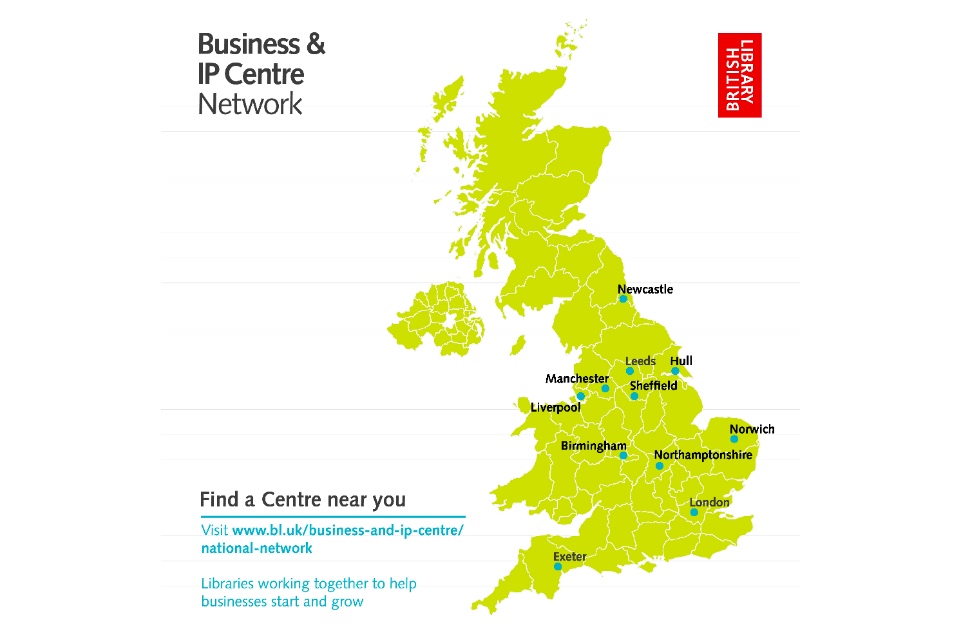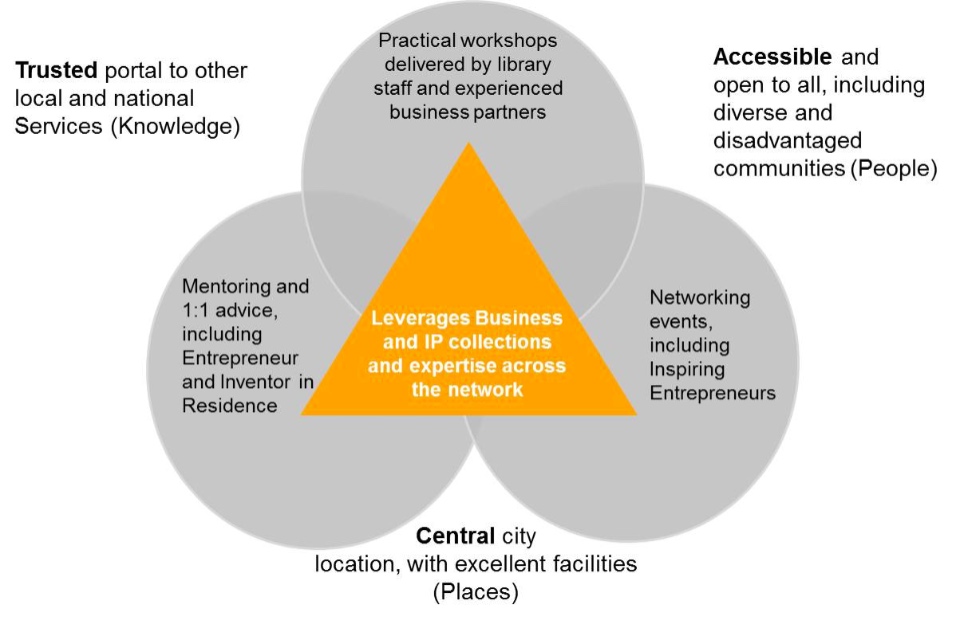British Library's Business & IP Centre national network
The British Library's Business & IP Centre national network contributes to local economic growth.

Business & IP Centre in the British Library. Photo credit: British Library
The British Library and 10 library services across the country form the Business & IP Centre national network. These are: Birmingham, Exeter (Devon), Hull, Leeds, Liverpool, Manchester, Newcastle, Norfolk, Northamptonshire and Sheffield.

British Library Business and IP Centre network map
Contribution to corporate priorities
The national network contributes to local economic growth and the greater prosperity outcome of Libraries Deliver.
Description of the work and the relationship
The Business & IP Centre national network is transforming city libraries into engines of innovation, economic growth and social mobility. The Business & IP Centres are physical hubs where people can come together to learn, network and access free and low-cost advice and support in protecting and commercialising a business idea. The national network has proven potential to create essential knowledge-based businesses and jobs in devolved cities across the UK at a relatively low cost, due to its consolidation of existing resources, knowledge and public buildings, as well as its unique public-private partnership model.
The project was kick-started in March 2012, with £100,000 from the Intellectual Property Office (IPO), which enabled the British Library to develop a blueprint of its model and conduct feasibility studies in five major cities, based on a successful pilot in Newcastle.
Enterprising Libraries was initially a £1.3 million partnership between the Department for Communities and Local Government (DCLG), Arts Council England (ACE) and the British Library, which enabled Newcastle Business & IP Centre to sustain its service and another five pilot projects in Birmingham, Leeds, Liverpool, Manchester and Sheffield, to become operational centres. It also supports ten innovative satellite projects to work with the centres in a hub and spoke model. The 10 were: Devon (Exeter), Enfield, Haringey, Hull, Greater Manchester, Middlesborough, Norfolk (Norwich), Northamptonshire, Portsmouth and Cultural Community Solutions (covering Harrow, Ealing and Hounslow).
Based on early successes and, in order to sustain the network over 2015/16 and bring on 2 new pilots from the satellite projects in Northamptonshire and Exeter (Devon), DCLG and ACE granted the British Library a further £400,000, in addition to the British Library’s commitment of £253,000 in cash and non-cash resources. In April 2016, Hull and Norwich also joined the network as pilot centres, continuing the legacy of Enterprising Libraries as a model of best practice for delivery of enterprise support services in libraries.
Outcomes achieved
An independent economic impact analysis of the national network over the period April 2013 – March 2015 revealed that Enterprising Libraries:
- generated £38 million GVA (Gross Value Added) on investment, with an estimated increase to £214 million by 2018
- created almost 1,700 new businesses and over 4,200 jobs, with an estimated increase to over 4,100 new businesses and over 22,000 new jobs within the next 3 years (almost a third in the ‘Northern Powerhouse’)
- created a payback of £4.50 for every £1 of public money (estimated to grow to £25 payback for every £1 invested by 2018)
- supported diverse communities: 47% of network users were women, 26% of users were BAME and 25% were unemployed or had been made redundant
- achieved lower cost per job created and higher GVA leverage, compared with other business support initiatives
These findings are summarised in an infographic on the British Library website.
Lessons learnt
Enterprising Libraries has delivered excellent results in a very short time and provided value for money. The model is fairly simple and is set out below, rooted in the collections and resources provided by a library. The service does not replace private sector business support providers, but rather works in partnership with them to deliver services within the centres. While sharing the same core service, services can be tweaked or tailored to suit local requirements.

British Library Business and IP Centre model
The benefits of the Business & IP Centres are that they:
- take advantage of existing assets in central city locations, thereby providing better value for money compared with many other business support programmes
- leverage libraries’ unique position as trusted and accessible places, which have experience in serving diverse and disadvantaged audiences
- can act as the ‘front door’ to business support and help to simplify the complex landscape, playing an important role in ‘Growth Hubs’
- provide economies of scale and makes the most of shared resources and expertise
- as a network, enable the delivery of much greater social and economic impact than any one library could achieve on its own
- support the government’s national and local growth agenda
Based on our experience and the economic evaluation, the British Library will concentrate on working with central libraries in major cities, which achieve a good spread across the UK. They will also prioritise those which already have IP and business collections and expertise, or the funding and commitment to achieve this quickly. The longer the centres have been running, the better the return on investment in terms of cost per job and GVA leverage. London and Newcastle achieved better results than the newly established centres, but the figures from others are expected to increase as the services mature and become further embedded into the local community.
Each centre learns from each other, sharing expertise and best practice at regular Knowledge Exchange days. Discussions explore new and innovative ways of delivering services, sharing of useful tools, specialist skills, marketing and promotion, event formats and partnership referrals. For example, throughout 2015-16 3 of the libraries hosted the Google Digital Garage and were able to offer advice and lessons learnt to one another. Exeter library has a FabLab with rapid prototyping equipment and other libraries are now developing services in this area. If successful - and funding permitting - these services could be further incorporated into other centres across the network.
Future plans
The British Library’s vision is to create an established network of 20 Business & IP Centres across the UK, which are the ‘front door’ to trusted face-to-face IP and innovation support. Drawing on the role of libraries as community hubs and leveraging knowledge and resources to spark local economic growth, they aim to embed enterprise and innovation at the heart of cities across the UK, and to create opportunities for people of all backgrounds, and from all walks of life, to engage in entrepreneurial activity and economic growth.
Additional resources
Latest videos from 8 of the Business and IP Centres in the network.
Contact: librariestaskforce@culture.gov.uk